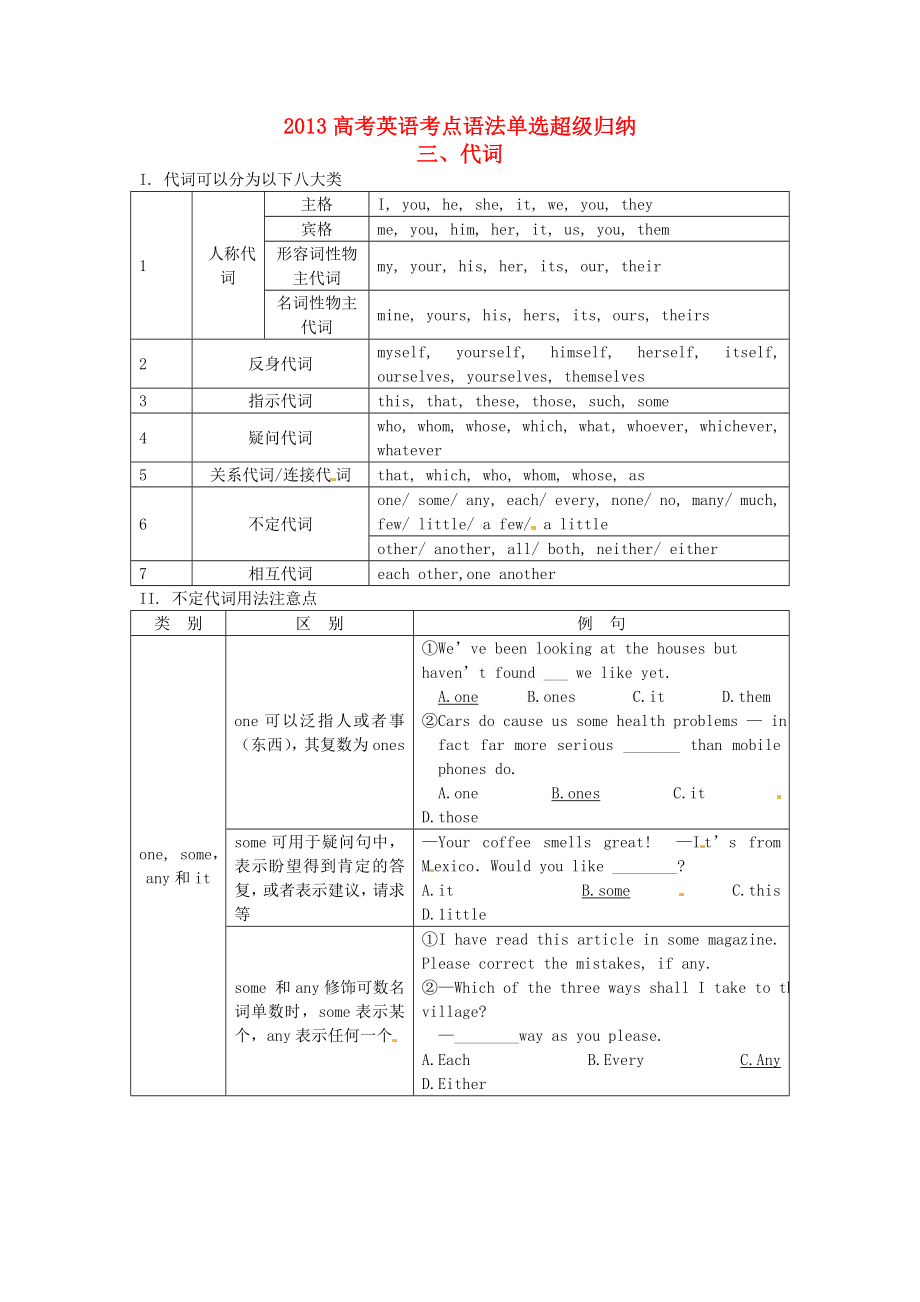《2013屆高考英語(yǔ) 考點(diǎn)語(yǔ)法歸納復(fù)習(xí)題3》由會(huì)員分享�,可在線閱讀�����,更多相關(guān)《2013屆高考英語(yǔ) 考點(diǎn)語(yǔ)法歸納復(fù)習(xí)題3(3頁(yè)珍藏版)》請(qǐng)?jiān)谘b配圖網(wǎng)上搜索�。
1、2013高考英語(yǔ)考點(diǎn)語(yǔ)法單選超級(jí)歸納
三�����、代詞
I. 代詞可以分為以下八大類(lèi)
1
人稱(chēng)代詞]
主格
I, you, he, she, it, we, you, they
賓格
me, you, him, her, it, us, you, them
形容詞性物主代詞
my, your, his, her, its, our, their
名詞性物主代詞
mine, yours, his, hers, its, ours, theirs
2
反身代詞
myself, yourself, himself, herself, itself, ourselves, you
2����、rselves, themselves
3
指示代詞
this, that, these, those, such, some
4
疑問(wèn)代詞
who, whom, whose, which, what, whoever, whichever, whatever
5
關(guān)系代詞/連接代詞
that, which, who, whom, whose, as
6
不定代詞
one/ some/ any, each/ every, none/ no, many/ much, few/ little/ a few/ a little
other/ another, all/ bo
3、th, neither/ either
7
相互代詞
each other,one another
II. 不定代詞用法注意點(diǎn)
類(lèi) 別
區(qū) 別
例 句
one, some�,
any和it
one可以泛指人或者事(東西)�,其復(fù)數(shù)為ones
①We’ve been looking at the houses but haven’t found ___ we like yet.
A.one B.ones C.it D.them
②Cars do cause us some health problems — in fact far more
4、 serious _______ than mobile phones do.
A.one B.ones C.it D.those
some可用于疑問(wèn)句中���,表示盼望得到肯定的答復(fù)���,或者表示建議,請(qǐng)求等
—Your coffee smells great! —It’s from Mexico.Would you like ________?
A.it B.some C.this D.1ittle
some 和any修飾可數(shù)名詞單數(shù)時(shí)�����,some表示某個(gè),any表示任何一個(gè)
5����、
①I(mǎi) have read this article in some magazine. Please correct the mistakes, if any.
②—Which of the three ways shall I take to the village?
—________way as you please.
A.Each B.Every C.Any D.Either
one指同類(lèi)中的一個(gè),it指代同一種類(lèi)的東西���。此外it還可以作形式主語(yǔ)���、形式賓語(yǔ)和用于強(qiáng)調(diào)句型中。
—There is still a cop
6��、y of the book in the library. Will you go and borrow ?
—No, I’d rather buy in the bookstore.
A.it;one B.one;one C.one;it D.it;it
some多用于肯定句�����,any多用于疑問(wèn)句和否定句
①There’s ________cooking oil in the house. Would you go to the corner store and get ________.
A.1ittle,some B.1
7���、ittle,any C.a little,some D.a little,any
②We had three sets of garden tools and we seemed to have no use for ________.
A.none B.either C.any D.each
③He doesn’t have _________ furniture in his room --just an old desk.
A. any B. many C. so
8�����、me D. much
each和every
each強(qiáng)調(diào)個(gè)別����,代表的數(shù)可以是兩個(gè)或兩個(gè)以上,而every強(qiáng)調(diào)整體�,所指的數(shù)必須是三個(gè)或三個(gè)以上
①Each student has a pocket dictionary.
Each (of us) has a dictionary. = We each have a dictionary.
②Every student has strong and weak points. / Every one of us has strong and weak points.
none和no
no等于not any,作定語(yǔ)
9�����、�����。none作主語(yǔ)或賓語(yǔ)���,代替不可數(shù)名詞��,謂語(yǔ)用單數(shù)����,代替可數(shù)名詞����,謂語(yǔ)單復(fù)數(shù)皆可以
①There is no water in the bottle.
②How much water is there in the bottle? None.
③None of the students are (is) afraid of difficulties.
other和another
other泛指“另外的����,別的”常與其他
詞連用����,如:the other day, every other
week, someother reason, no other way,
the other
10�����、特指兩者中的另外一個(gè)�,復(fù)數(shù)為the others
①Both sides have accused of breaking the contract.
A. another B. the other C. neither D. each
②Two students in our class failed, but all the others passed the exam.
another指“又一個(gè),另一個(gè)”無(wú)所指�����,
復(fù)數(shù)形式是others�����,泛指“別的人或
事”
①We had a picnic last term and i
11����、t was a lot of fun,so let’s have ______ one this month.
A.the other B.some C.a(chǎn)nother D.other
②The trousers are too long, please give me another pair / some others.
③Some like football, while others like basketball.
either和neither
前者意思為:兩者都(兩者中任何一方都)��;后者意思為:兩者都
①—Do you want tea or coffee? — ______, I really don't mind.
A. none B. neither C. either D. all
②It was hard for him to learn English in a family, in which _____ of the parents spoke the language.
A. none B. neither C. both D. each
 2013屆高考英語(yǔ) 考點(diǎn)語(yǔ)法歸納復(fù)習(xí)題3
2013屆高考英語(yǔ) 考點(diǎn)語(yǔ)法歸納復(fù)習(xí)題3

